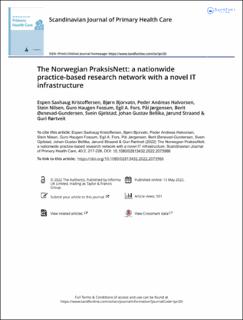The Norwegian PraksisNett: a nationwide practice-based research network with a novel IT infrastructure
Kristoffersen, Espen Saxhaug; Bjorvatn, Bjørn; Halvorsen, Peder Andreas; Nilsen, Stein; Fossum, Guro Haugen; Fors, Egil Andreas; Jørgensen, Pål; Øxnevad-Gundersen, Berit; Gjelstad, Svein; Bellika, Johan Gustav; Straand, Jørund; Rørtveit, Guri
Journal article, Peer reviewed
Published version

Åpne
Permanent lenke
https://hdl.handle.net/11250/3032843Utgivelsesdato
2022Metadata
Vis full innførselSamlinger
Originalversjon
Scandinavian Journal of Primary Health Care. 2022, 40 (2), 217-226. 10.1080/02813432.2022.2073966Sammendrag
Clinical research in primary care is relatively scarce. Practice-based research networks (PBRNs) are research infrastructures to overcome hurdles associated with conducting studies in primary care. In Norway, almost all 5.4 million inhabitants have access to a general practitioner (GP) through a patient-list system. This gives opportunity for a PBRN with reliable information about the general population. The aim of the current paper is to describe the establishment, organization and function of PraksisNett (the Norwegian Primary Care Research Network). Materials and Methods We describe the development, funding and logistics of PraksisNett as a nationwide PBRN. Results PraksisNett received funding from the Research Council of Norway for an establishment period of five years (2018–2022). It is comprised of two parts; a human infrastructure (employees, including academic GPs) organized as four regional nodes and a coordinating node and an IT infrastructure comprised by the Snow system in conjunction with the Medrave M4 system. The core of the infrastructure is the 92 general practices that are contractually linked to PraksisNett. These include 492 GPs, serving almost 520,000 patients. Practices were recruited during 2019–2020 and comprise a representative mix of rural and urban settings spread throughout all regions of Norway. Conclusion Norway has established a nationwide PBRN to reduce hurdles for conducting clinical studies in primary care. Improved infrastructure for clinical studies in primary care is expected to increase the attractiveness for studies on the management of disorders and diseases in primary care and facilitate international research collaboration. This will benefit both patients, GPs and society in terms of improved quality of care.
